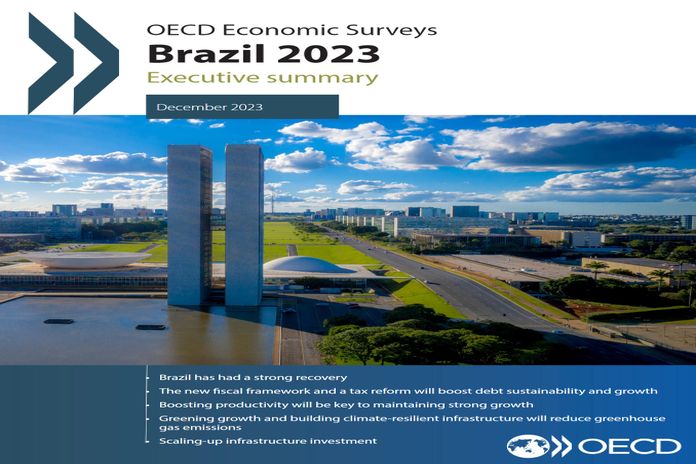FRANCE / BRAZIL – The Brazilian economy rebounded strongly from the COVID-19 pandemic and has performed well during 2023. Structural reforms are needed to durably support Brazil’s development path and lift potential growth, according to a new OECD report.
The latest OECD Economic Survey of Brazil says that GDP growth is projected to slow in 2024 to 1.8 percent, before picking up in 2025 to 2 percent. Domestic demand will grow at a more moderate pace next year as a result of tighter credit conditions and a mild global slowdown.
Boosting productivity will be key to maintaining strong growth. Recent reforms have reduced unnecessary bureaucracy and regulations, but further efforts are needed to reduce administrative burdens on markets for goods and services that hamper competition and productivity growth. Lowering trade barriers for deeper integration in global value chains would also help improve the economy’s growth performance. Average import tariffs are about eight times higher than in Mexico, for instance.
The sustainability of the public finances can be further strengthened. Public debt remains high compared with other emerging market economies. A new fiscal framework has been established and will now need to be implemented. The planned reform of the fragmented system of consumption taxes will reduce compliance costs substantially and there is also scope to make government spending more efficient.
The labour market would benefit from higher female labour force participation and lower informality. Labour force participation and employment are about 20 percentage points lower for women than for men. Limited access to early childhood education is one barrier to women’s access to the labour market. Only about one-third of all children under the age of three in Brazil are enrolled in daycare.
The pandemic has worsened the educational attainment of children from disadvantaged backgrounds. Despite high public spending on education relative to GDP, resources could be better targeted towards improving equalities of opportunities. Moreover, participation in vocational education programmes remains low and post-secondary vocational education opportunities are limited.
Reforms should focus on improving early childhood education and the development of a comprehensive strategy to foster formalisation through lower non-wage labour costs, better skills provision and stronger enforcement.
Brazil needs to accelerate the green transition. To reduce greenhouse gas emissions, it should continue to strengthen the enforcement of the Forest Code to tackle deforestation, develop rural economies and incentivise innovation.
Public infrastructure is particularly vulnerable to climate shocks, and infrastructure investment is low in international comparison. Better planning, including tighter coordination across the federal and subnational governments, and reducing risks associated with long-run infrastructure projects has the potential to attract more private and international financing.





